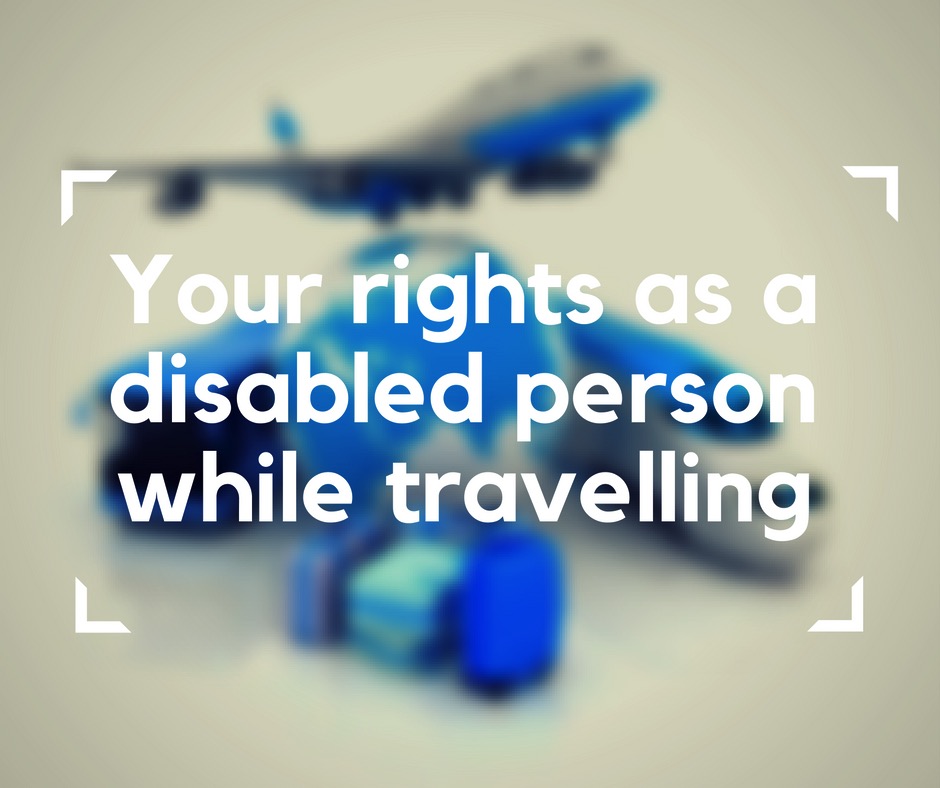Being on a manual or electric wheelchair doesn’t mean limited travels. The first step to having your rights respected is to know them. Knowledge can be your power, and turn your life around. What are your rights as a disabled person when you are travelling?
Airplanes

1 If moving on a manual or electric wheelchair, you are entitled to assistance at airports
The airlines are obliged to provide you with assistance, free of charge. It includes getting on and off the plane, navigating the airport before and after your flight and some assistance with personal and baggage check-in process. Even though you’re not always obliged to do it, it is a good idea to call them ahead so they could be prepared. Notifying the airline is obligatory if you travel with an electric wheelchair, as it has special batteries inside. Contacting your airport 48 hours before a flight should give them enough time to organise everything. You also need to make sure whether toilets are tailored to wheelchair users’ needs because it’s not the case for every plane.
2 While you are entitled to assistance in the airport, the airline is not required to provide you with the assistance of the flight assistant.
In some cases, airlines may require a manual or electric wheelchair user to travel with an assistant, mainly in case of severe hearing and severe vision impairments, which may make a person unable to respond to safety instructions. Even in such cases, an airline is not obliged to provide much extra help. The staff should help you move to and from seats, for example, but further assistance is not always granted. In many cases, airplanes are willing to help, though, for example asking an off-duty member to staff to assist you if you need any help. You can also ask another passenger for some aid, if necessary. Important to remember: the airline staff is not expected to carry you to a bathroom, if you don’t have your own airplane chair. If you call the airline ahead, they will make sure it’s there for you. Planning in time, saves stitch in nine!
3 Airlines are not required to provide you with in-flight emergency medical assistance
As much as airlines’ staff is taught how to give the first aid, the use of certain emergency medical equipment is not in their duties and is restricted to medical professionals, who are onboard and decide to help.
4 You don’t need to provide your airline with a medical certificate validating your using a manual or electric wheelchair
You are not required to provide any documents, unless you, for example, need medical oxygen during flight.
5 You can’t be denied boarding because of your wheelchair
The only situation in which they can legally deny your boarding is when the airplane is physically too small or there are some security concerns to be taken into consideration.
6 You have a right to ask for a private screening
If regular screening techniques can’t be used during your security screening, alternate screening techniques including pat-downs should be used. It is also your right to ask for it to be done in private if you wish.
These are a few things you need to know when you travel by plane as a disabled person. Specific regulations will depend on the area you live in and the policy of airlines, so it’s always a good idea to research a subject on your own too, depending on your geographic location. One thing sure: you have a right to travel by plane like everyone else, and that’s something they can’t deny you, at least in most of the cases.
Trains
 1 You are entitled to assistance at train stations
1 You are entitled to assistance at train stations
Just like in airplanes, you have a right to ask for assistance in getting on and off trains and changing your trains. This service should be always free of charge.
2 You can’t be denied boarding
Generally, you are entitled to use their services just like everyone else. Sometimes, though, legal health and safety requirements can’t be met and a safe journey is not possible – this when you can be denied your place in a train.
3 You may not be obliged to contact the company before your journey, but it would be nice for you to do so
Notifying the company in advance makes it easier for them to provide you with the best possible service. Wouldn’t you like to get a top-notch treatment? Calling the company ahead is a way to go!
It’s worth to note that each company may have its own policy towards wheelchair users, so becoming familiar with their regulations may save you much trouble and change any doubts into the past tense.
Buses and coaches
 1 Your travel assistant can travel with you for free if it’s necessary
1 Your travel assistant can travel with you for free if it’s necessary
If any security or safety problems are solved when your assistant is with you, this person should be able to travel with you free of charge.
2 You are entitled to assistance in getting off and on the bus
You should be given help in getting on and off the bus, and that help should be free of charge. Again, it’s worth to notify the company in advance – at least 36 hours before your journey – so they could prepare well.
Ships
 1 You’re entitled to assistance in getting on and off a ship and changing boards
1 You’re entitled to assistance in getting on and off a ship and changing boards
You can also ask for help on board and at a port. It’s a service that should be free of charge.
2 If you need company for safety reasons, your companion should be granted a journey for free.
Must-remember: even though most of rights’ described in the post are valid internationally, they may vary slightly in different countries. To make sure how things look in your country, I would advise you to visit the government’s or transport companies’ websites. They are often an excellent source of information on the subject.
Your rights are regulated by international organisations and these organisations stand on their guard, so you can always notify them if you think you’ve been mistreated. Remember you can travel comfortably, and you should always have a chance to do so. Just be informed of your rights, as you are the most important person standing on their guard.


